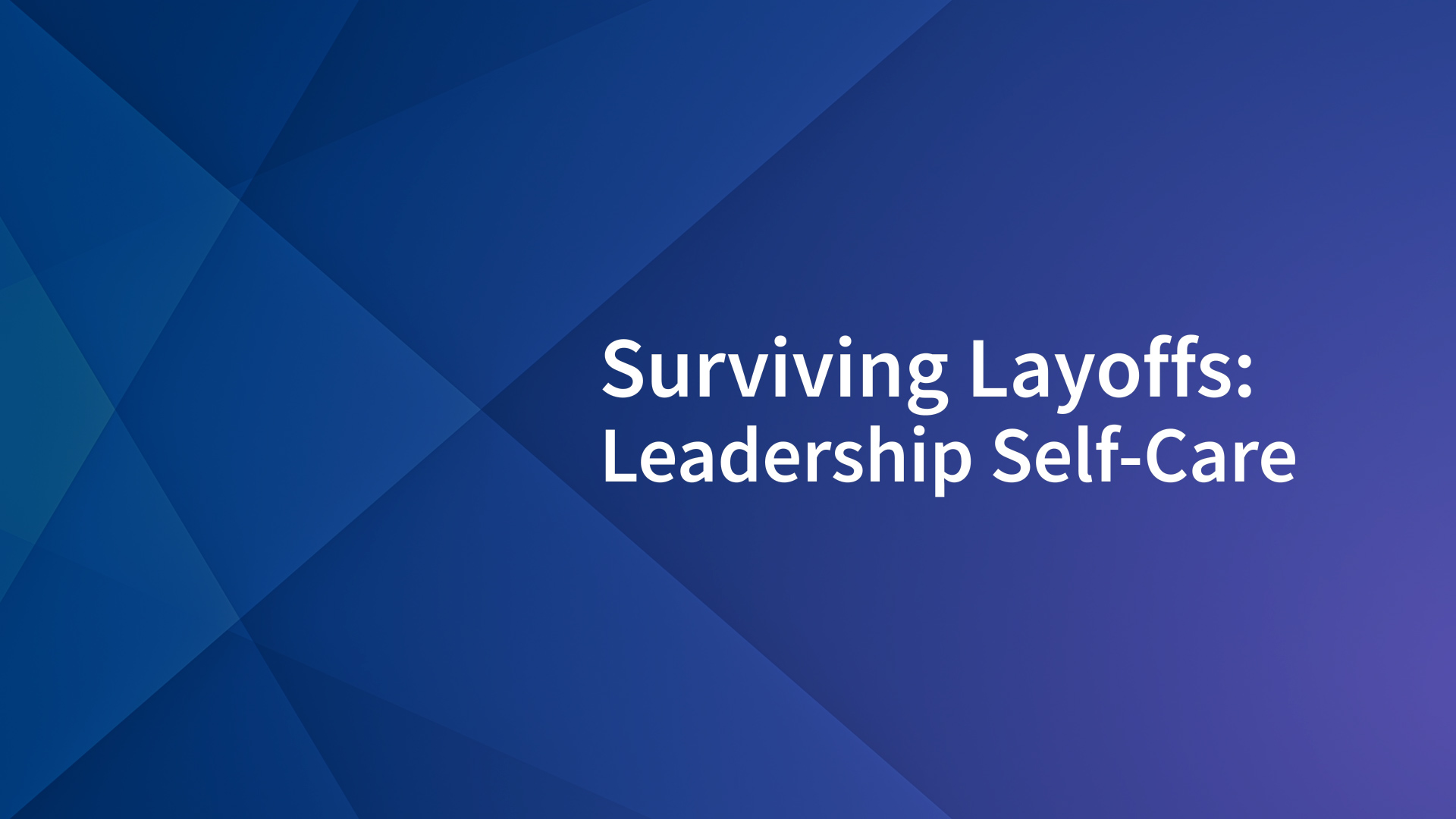Heather Myers, Ph.D., shares what your organization can do to support your leadership and what leaders can do to help take care of themselves to best navigate the difficulties of layoffs.
ICYMI, for surviving layoffs Heather previously covered:
- Introduction
- What Is the Negative Impact?
- 3 Steps to Take Before & During Layoffs
- Rebuilding Relationships Post-Layoffs
Watch the full series here.
Transcript:
Hi, I’m Heather Myers, the Chief Psychology Officer at Traitify.
I’d like to welcome you back to the fifth and final video in our Surviving Layoffs series.
This video will talk about what your organization can do to support your leadership and what leaders can do to help take care of themselves during this difficult time.
So let's start by talking about what your organization can do to take care of leaders.
Make sure that leaders have someone they can turn to, a place where they can air their concerns and grievances without worrying about upper management hearing or knowing what they're talking about. If you have any external resources available, remind your managers of what you have available for them.
Then, be as transparent as possible in communications with them. Share with your leaders the rationale behind all decisions, as well as the organizational goals and the anticipated outcomes. Let them know what they are expected to do. Are they the ones who are going to choose who from their team gets let go or is that something that you are going to tell them? Are they expected to deliver the news to the people who are getting laid off and to the people who are staying? Be very clear about what information they can and should share, and what they should not.
And finally, make upper management available to answer any questions and discuss any problems that might arise. It’s so important for your managers to have -- and leaders -- to have access to upper management for these kinds of situations.
So then what can leaders do to help take care of themselves.
First of all, remember you are not superhuman, and you don't have to be. Allow yourself to be human. Take a day or two off, or even just a couple hours if you can, to process what's going on and to shift your own mindset. Remember, sometimes you have to make the hard call, and that's okay. Don't beat yourself up over it, but do give yourself time to process the emotions that you're feeling, and then get back into it.
Then be proactive. Convince yourself to have the difficult conversations, be they with upper management or with your direct reports. Let other people express their emotions, and double down on creating a psychologically safe environment -- where people feel and know that they can come to you and air their concerns without there being repercussions for them. Listen to what they have to say and repeat it back to them. You want to make sure that you understand what they're saying, and you want them to really, truly feel heard.
And finally, be honest. Communicate on the rationale for the layoffs and any progress towards the company's goals. If you can't tell them something, be honest about that, as well. Remember, you are not all-knowing, and no one expects you to be. Finally, acknowledge the emotions that everyone is feeling. It's okay to have them. Acknowledge them, as well as communicating the logic behind the decisions.
If you do these things, your direct reports will feel heard and listened to and taken care of during this process, which will lead to a smoother transition for all of you.
This concludes our Surviving Layoffs series. I hope it's been helpful. Thank you for listening, and have a great day.
To learn how to survive layoffs by leveraging fast, visual-based assessments, connect with Traitify.
Sources:
- Brockner, J., Davy, J., & Carter, C. (1985). Layoffs, self-esteem, and survivor guilt: Motivational, affective, and attitudinal consequences. Organizational Behavior and Human Decision Processes, 36(2), 229–244. https://doi.org/10.1016/0749-5978(85)90014-7
- Brockner, J., Greenberg, J., Brockner, A., Bortz, J., Davy, J., & Carter, C. (1986). Layoffs, Equity Theory, and Work Performance: Further Evidence of the Impact of Survivor Guilt. Academy of Management Journal, 29(2), 373–384. https://doi.org/10.5465/256193
- Campbell-jamison, F., Worrall, L., & Cooper, C. (2001). Downsizing in Britain and its effects on survivors and their organizations. Anxiety, Stress & Coping, 14(1), 35–58. https://doi.org/10.1080/10615800108248347
- IMPACT Group. (2017). The SMART and Compassionate Guide to Reducing Your Staff [E-book]. https://cdn2.hubspot.net/hubfs/1856621/Reducing_Your_Staff_The_SMART_and_Compassionate_Guide.pdf
- Johnson, R. S. (2020, May 11). Caring for Leadership During Tough Times. Traitify Blog. https://blog.traitify.com/caring-for-leadership-during-tough-times
- Murphy, M. (2015). Don’t Expect Layoff Survivors to be Grateful. Leadership IQ. https://www.leadershipiq.com/blogs/leadershipiq/29062401-dont-expect-layoff-survivors-to-be-grateful
- Murphy, M. (2019, October 21). How To Help Your Employees Overcome Survivor Guilt After A Layoff. Forbes. https://www.forbes.com/sites/markmurphy/2019/10/22/how-to-help-your-employees-overcome-survivor-guilt-after-a-layoff/#52b201e92edf
- Wolfe, H. (2004). Survivor Syndrome: Key Considerations and Practical Steps. Institute for Employment Studies. https://www.employment-studies.co.uk/system/files/resources/files/mp28.pdf





